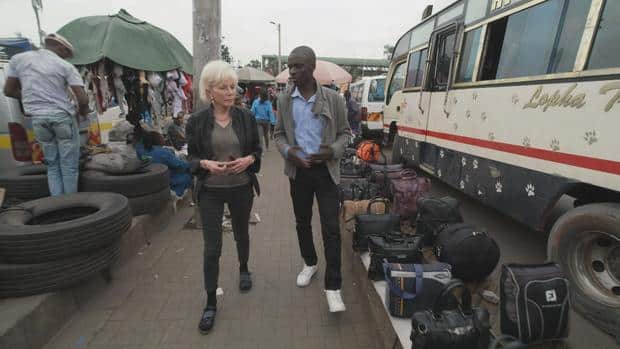Being overworked, underpaid, and ill-treated is not what Kenyan workers had in mind when they were lured by U.S. companies with jobs in AI.
Kenyan civil rights activist Nerima Wako-Ojiwa said the workers’ desperation, in a country with high unemployment, led to a culture of exploitation with unfair wages and no job security.
“It’s terrible to see just how many American companies are just doing wrong here,” Wako-Ojiwa said. “And it’s something that they wouldn’t do at home, so why do it here?”
Why tech giants come to Kenya
The familiar narrative is that artificial intelligence will take away human jobs, but right now it’s also creating jobs. There’s a growing global workforce of millions toiling to make AI run smoothly. It’s gruntwork that needs to be done accurately and fast. To do it cheaply, the work is often farmed out to developing countries like Kenya.
Nairobi, Kenya, is one of the main hubs for this kind of work. It’s a country desperate for work. The unemployment rate is as high as 67% among young people.
“The workforce is so large and desperate that they could pay whatever and have whatever working conditions, and they will have someone who will pick up that job,” Wako-Ojiwa said.
60 Minutes
Every year, a million young people enter the job market, so the government has been courting tech giants like Microsoft, Google, Apple and Intel. Officials have promoted Kenya as a “Silicon Savannah” — tech savvy and digitally connected.
Kenyan President William Ruto has offered financial incentives on top of already lax labor laws to attract the tech companies.
What “humans in the loop” do with AI
Naftali Wambalo, a father of two with a college degree in mathematics, was elated to find work in Nairobi in the emerging field of artificial intelligence. He is what’s known as a “human in the loop”: someone sorting, labeling and sifting through reams of data to train and improve AI for companies like Meta, OpenAI, Microsoft and Google.
Wambalo and other digital workers spent eight hours a day in front of a screen studying photos and videos, drawing boxes around objects and labeling them, teaching AI algorithms to recognize them.
Human labelers tag cars and pedestrians to teach autonomous vehicles not to hit them. Humans circle abnormalities in CTs, MRIs and X-rays to teach AI to recognize diseases. Even as AI gets smarter, humans in the loop will always be needed because there will always be new devices and inventions that’ll need labeling.
Humans in the loop are found not only in Kenya, but also in India, the Philippines and Venezuela. They’re often countries with low wages but large populations — well educated, but unemployed.
Unfair labor practices
What seemed like a ticket to the future was quickly revealed to be anything but for some humans in the loop, who say they’ve been exploited. The jobs offer no stability – some contracts only offer employment for a few days, some weekly and others monthly, Wako-Ojiwa said. She calls the workspaces AI sweatshops with computers instead of sewing machines.
The workers aren’t typically hired directly by the big tech companies – instead, they are employed by mostly American outsourcing companies.
The pay for humans in the loop is $1.50-2 an hour.
“And that is gross, before tax,” Wambalo said.
Wambalo, Nathan Nkunzimana and Fasica Berhane Gebrekidan were employed by SAMA, an American outsourcing company that hired for Meta and OpenAI. SAMA, based in the California Bay Area, employed over 3,000 workers in Kenya. Documents reviewed by 60 Minutes show OpenAI agreed to pay SAMA $12.50 an hour per worker, much more than the $2 the workers actually got, though SAMA says what it paid is a fair wage for the region.
Wambalo disagrees.
“If the big tech companies are going to keep doing this business, they have to do it the right way,” he said. “It’s not because you realize Kenya’s a third-world country, you say, ‘This job I would normally pay $30 in U.S., but because you are Kenya, $2 is enough for you.'”
60 Minutes
Nkunzimana said he took the job because he has a family to feed.
Berhane Gebrekidan lived paycheck to paycheck, unable to save anything. She said she saw people who were fired for complaining.
“We were walking on eggshells,” she said.
They say SAMA pushed workers to complete assignments faster than the companies required, an allegation SAMA denies. If a six-month contract was completed in three months, they could be out of work without any pay for those extra months. They did say Sama would reward them for fast work.
“They used to say ‘thank you.’ They give you a bottle of soda and KFC chicken. Two pieces. And that is it,” Wambalo said.
Ephantus Kanyugi, Joan Kinyua, Joy Minayo, Michael Geoffrey Asia and Duncan Koech all worked for Remotaks, a click-work platform operated by Scale AI — another American AI training company facing criticism in Kenya. Workers signed up online and selected remote work, getting paid per task. They said they sometimes went unpaid.
“When it gets to the day before payday, they close the account and say that you violated a policy,” Kanyugi said.
Employees say they have no recourse or even a way to complain.
The company told 60 Minutes that any work done “in line with our community guidelines was paid out.” In March, as workers started complaining publicly, Remotasks abruptly shut down in Kenya, locking all workers out of their accounts.
The mental toll of AI training
Workers say some of the projects for Meta and OpenAI also caused them mental harm. Wambalo was assigned to train AI to recognize and weed out pornography, hate speech and excessive violence from social media. He had to sift through the worst of the worst content online for hours on end.
“I looked at people being slaughtered,” Wambalo said. “People engaging in sexual activity with animals. People abusing children physically, sexually. People committing suicide.”
Berhane Gebrekidan thought she’d been hired for a translation job, but she said what she ended up doing was reviewing content featuring dismembered bodies and drone attack victims.
60 Minutes
“I find it hard now to even have conversations with people,” she said. “It’s just that I find it easier to cry than to speak.”
Wambalo said the material he had to review online has hurt his marriage.
“After countlessly seeing those sexual activities, pornography on the job, that I was doing, I hate sex,” he said.
SAMA says mental health counseling was provided by “fully-licensed professionals.” Workers say it was woefully inadequate.
“We want psychiatrists,” Wambalo said. “We want psychologists, qualified, who know exactly what we are going through and how they can help us to cope.”
Workers fight back
Wambalo and Berhane Gebrekidan are among around 200 digital workers suing SAMA and Meta over “unreasonable working conditions” that caused them psychological problems.
“It was proven by a psychiatrist that we are thoroughly sick,” Nathan Nkunzimana said “We have gone through a psychiatric evaluation just a few months ago and it was proven that we are all sick, thoroughly sick.”
Wambalo said it’s the responsibility of the big tech companies to know how the jobs are impacting workers.
“They are the ones providing the work,” he said.
Berhane Gebrekidan feels the companies know the people they employ are struggling, but they don’t care.
“…Just because we’re Black, or just because we’re just vulnerable for now, that doesn’t give them the right to just exploit us like this,” she said.
Kenya does have labor laws, but they are outdated and don’t touch on digital labor, Wako-Ojiwa, the civil rights activist, said.
“I do think that our labor laws need to recognize it, but not just in Kenya alone,” Wako-Ojiwa said. “Because what happens is when we start to push back, in terms of protections of workers, a lot of these companies…they shut down and they move to a neighboring country.”
SAMA has terminated the harmful content projects Wambalo and Berhane Gebrekidan were working on. The company would not agree to an on-camera interview and neither would Scale AI, which operated the Remotasks website in Kenya.
Meta and OpenAi told 60 Minutes they’re committed to safe working conditions, including fair wages and access to mental health counseling.












